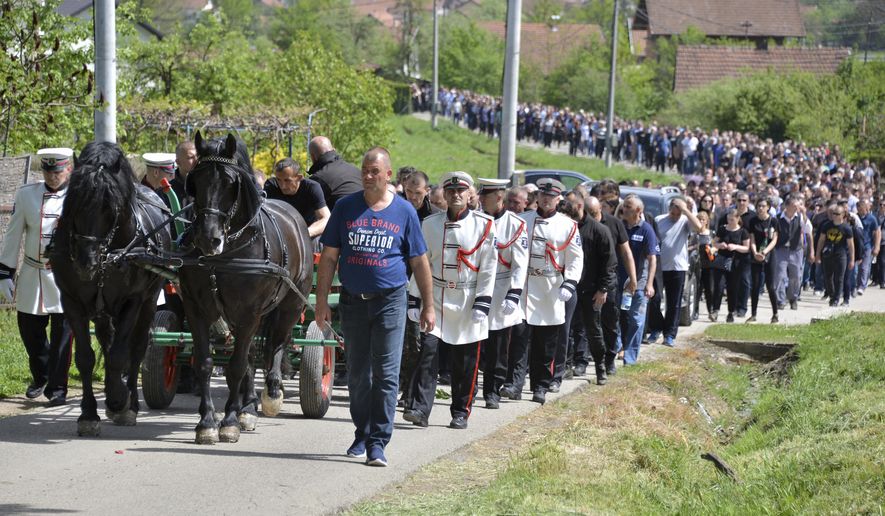SARAJEVO, Bosnia-Herzegovina (AP) - Sobbing with grief, thousands of Bosnians attended the funeral Thursday of a prominent Bosnia Serb businessman and government critic who was gunned down earlier this week in a mafia-style ambush.
Slavisa Krunic, who owned several businesses including a private security firm, Sector Security, was buried in his village outside the northern Bosnian city of Banja Luka. Krunic was slain Monday in a late-night ambush outside his home.
Several thousand people, many of them distraught, followed Krunic’s coffin as it was brought to the cemetery on a horse-driven carriage flanked by uniformed security guards from his firm.
Krunic’s bodyguard and one of the attackers were also killed in the execution, which sparked a shootout. After the attack, other critics of the ruling Bosnian Serb nationalist party and its hard-line leader, Milorad Dodik, voiced fears that they too might be targeted.
“When they can execute a well-protected man who took his personal security very seriously, what can others expect?” Slobodan Vaskovic, a popular Bosnian Serb blogger critical of the ruling elites, wrote on social media.
The slain attacker was identified as a well-known criminal who should have been serving a 5-year prison sentence for robberies but was free due to a clerical error.
Police in Bosnia’s Serb-run part of the Balkan nation arrested another suspected shooter, also a known criminal, and are searching for another man with ties to Serbian mafia. Police said the detained suspect insisted he was innocent.
Krunic, a vocal critic of Dodik, had accused him of stoking tensions in Bosnia to divert attention from his corrupt practices. Krunic also insisted the companies he owned would hire and serve people of all races and religions, contrary to Dodik’s Serbian-first attitude.
“We are on the side of the forces that want to build this country and not to destroy it,” Krunic said recently.
Bosnian Serb Interior Minister Dragan Lukac told lawmakers that police will “do everything in their power . to solve this case.”
The autopsy of Krunic’s body revealed that the 48-year-old father of four had been killed by a burst of bullets to his head from an automatic rifle as his car turned into the driveway of his house. Bosnian media claimed, quoting unnamed sources close to the investigation, that the assassins had used armor-piercing bullets.
Drasko Stanivukovic, a prominent opposition lawmaker who is a distant relative of Krunic’s, said Thursday that people were increasingly warning him to keep quiet out of fear that he might be the next government critic to “end up dead.”
Bosnian Security Minister Dragan Mektic, a member of a Bosnian Serb opposition party, accused Dodik in a tweet Wednesday of “putting targets on the backs” of critics, including Krunic.
Krunic’s slaying comes amid growing tensions in Bosnia that have been fueled by a decision of the country’s Serb-run region to establish an auxiliary police force of over 1,000 officers after buying a large amount of automatic weapons from Serbia.
According to stolen diplomatic cables published by WikiLeaks, Krunic told the U.S. embassy in Sarajevo in 2008 that people close to Dodik were pressuring him to sell Sector Security, which employees Bosnians of all ethnic backgrounds, to a private security firm under their control. According to the cable, Krunic speculated that Dodik “wants control over Sector Security’s 900 men in uniform.”
In 2009, a U.S. diplomat linked to the international team overseeing Bosnia banned several Serb-run private security companies, citing “incontrovertible” evidence that they were engaged in “illegal intelligence and counterintelligence activities” such as protecting Bosnian Serb war crimes suspects on the run.
An ardent pro-Russian nationalist, Dodik has pressed for Serbs to separate from multi-ethnic Bosnia. Earlier this month, Dodik sparked outrage by claiming erroneously that the well-documented 1995 genocide in the Bosnian town of Srebrenica - where over 8,000 Muslim men and boys were slaughtered by Bosnian Serb troops - was “a fabricated myth” by the country’s Muslims.
Dodik is currently subject to U.S. sanctions for “actively obstructing” the Dayton peace accords, which ended Bosnia’s 1992-95 war by splitting the country into two highly independent parts, one run by Serbs and the other shared by Muslims and Croats.




Please read our comment policy before commenting.